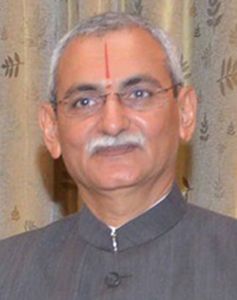I WAS BORN in a middle-class family of agriculturists in Machilipatnam, Andhra Pradesh. In our family, my father was the first to be formally educated. He became an advocate. I am the first to be in government service.
After schooling, I left for Chennai to pursue my bachelor's in mathematics, and then did my MSc at IIT. After graduation, I joined a bank as there was an immediate need for a job, but I asked my father if I could give one shot at the civil services while earning a living. I prepared as I worked.
Those days, hard work and good grounding in a couple of subjects were enough to clear the civil services exam. I joined the IRS in 1978 and served till 2014. After retiring as chairman of the Central Board of Direct Taxes, and a short stint as adviser to the department of revenue on black money, I was appointed as the central vigilance commissioner.
There was an undercurrent of opposition and my appointment was even challenged in the Supreme Court. It was the first time that a person not belonging to the IAS was appointed as CVC, though no rule prohibited such an appointment. Wild and baseless allegations made in the PIL filed against my appointment were dismissed by the apex court when it upheld my appointment in 2018.
The recently retired CVC Suresh N. Patel is also not from the civil services. He was chairman and managing director of Andhra Bank. The members of Lokpal belong to different services like IAS, IPS, IRS and the judiciary. The current government is identifying persons with integrity and competence, including from the private sector (like SEBI chairperson Madhabi Puri Buch), and appointing them to senior positions that have traditionally been held by IAS officers. This enables persons with wider experience and exposure from outside the IAS to look at issues from a different perspective to attempt to improve the administration.
More than three-and-half decades in the income tax department and, in particular, the investigative skills, knowledge of law, accountancy and finances, and experience of issuing well-reasoned orders helped me to efficiently discharge my duties as CVC.
Early in my career, I got the opportunity to work in investigation and central charges in the IT department. I had more than reasonable success and more than once, I was transferred out of such posts and even to far-off places, perhaps as a consequence of such success. As an additional commissioner (income tax) in Tamil Nadu, after allegations of corruption and disproportionate assets were raised against a former chief minister, her cabinet colleagues, associates and some senior civil servants, I led the team probing the tax evasion angle. We uncovered substantial undisclosed incomes and prosecutions were initiated. When some of the accused approached the government for compounding of offences, I recommended compounding of the offences of non-filing and delayed filing of returns on payment of a substantial fee as they satisfied the conditions laid down in the guidelines.
As a public servant, one has to follow the guidelines, rules, law and act accordingly, and not on whims and fancies. When officers take action, which is an unpleasant job, they do not have to be rude, harsh or impolite. The job can be done with poise and dignity.
As director general of income tax investigation in Delhi, I led the probe into the Commonwealth Games scam. Allegations came to light during the games and any action then could have brought the country to disrepute. So, we waited for the games to end and used the time to collect evidence. Afterwards, we established tax evasion and instances of bribery against several government and private functionaries.
I was also part of the probes of the coal scam, the 2G case and undisclosed foreign accounts. It was a great and challenging experience to make presentations before the joint parliamentary committee and the Supreme Court in the 2G case. Undisclosed foreign assets cases were different; we had no treaties for exchange of information with some important countries. We devised novel methodologies to obtain copies of bank accounts in such cases.
As CVC, I initiated the integrity pledge by citizens and public servants which became reasonably popular. Spreading the message of anti-corruption through the pledge and vigilance awareness weeks, debates, discussions, dramas and street plays, involving employees, students and the public was effective. The evaluation of the integrity of organisations through an index designed in association with an IIM and the concerned department/PSU was also a novel and useful initiative. The vigilance manual was revised comprehensively during my tenure, after almost a decade.
The CVC also supervises the CBI's work. Supervision was earlier limited to review of monthly statistical reports of pending/closed cases. There was a difference of opinion on the extent of supervision beyond the statistical review and, to set the record straight, I sought the opinion of the attorney general who unequivocally opined that CVC has the power and duty to review investigations of individual cases subject to the limitations prescribed in the law. This demonstrated that oversight mechanisms are important for any institution. We had the unpleasant task of inquiry into matters relating to senior serving CBI officers―an issue about which, because of the oath of secrecy, I cannot delve into details.
In bureaucracy, challenges never end. Tough measures are to be taken and tougher lessons are to be learnt by the bureaucracy, which has been trying hard to shed its colonial baggage and the image of being corrupt.
The writer, a 1978 batch IRS officer, was the central vigilance commissioner from 2015 to 2019.
As told to Namrata Biji Ahuja



